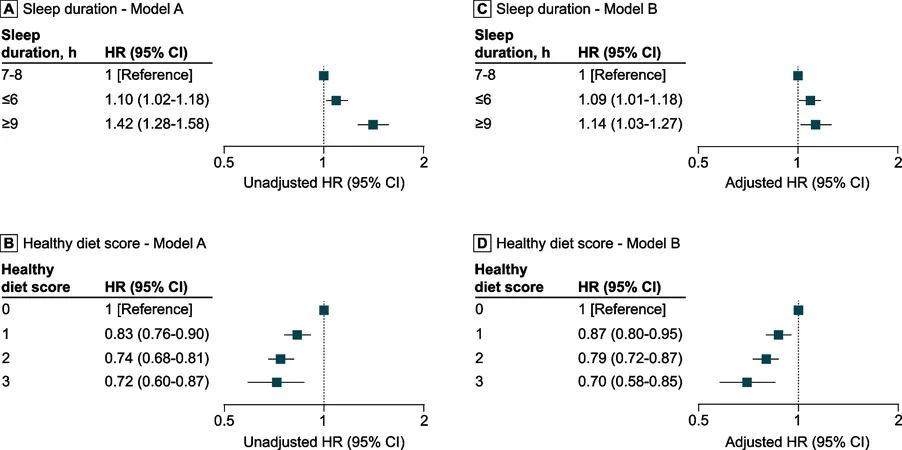
The Critical Link Between Sleep Duration, Diet Quality, and Digestive System Cancer Mortality: What You Need to Know!
2025-01-27
Author: Nur
The Critical Link Between Sleep Duration, Diet Quality, and Digestive System Cancer Mortality: What You Need to Know!
As cancer continues to impose a significant burden on public health globally, focusing on prevention strategies is more crucial than ever. Digestive system cancers, in particular, have come under scrutiny due to their high morbidity and mortality rates. Recent studies have provided compelling evidence linking sleep duration and diet quality to the risk of these cancers, with findings that are both surprising and alarming!
The Alarming Connection Between Sleep Duration and Cancer Risk
Epidemiological research reveals a strong relationship between daily sleep duration and the development of digestive cancers. For example, a study conducted on the UK Biobank cohort indicated that people who sleep more than nine hours a day are at a higher risk for oesophageal adenocarcinoma compared to those who sleep seven hours. Similarly, another American study found associations between both short (<6 hours) and long (>9 hours) sleep patterns and hepatocellular carcinoma incidence. Moreover, residents of Spain demonstrated a correlation between longer sleep durations and an elevated risk of gastric and colorectal cancers.
Several theories aim to explain this troubling connection. Changes in gut microbiota due to inadequate sleep have been noted, which can lead to an imbalance potentially contributing to cancer cell development. Additionally, animals deprived of sleep displayed serious gastrointestinal issues, including gastric lesions and heightened gastric acidity. The implications are staggering: gastrointestinal functions, influenced by the circadian rhythm governing essential body processes, are particularly susceptible to irregular sleep patterns.
Diet Matters: The Power of Nutrition in Cancer Prevention
Aside from sleep, diet plays a critical role in determining cancer risk, particularly regarding the intake of fiber, fruits, vegetables, and processed foods like meats. Studies show that higher fiber consumption is associated with a significantly reduced risk of colorectal cancer, while abundant fruit and vegetable intake has protective effects against various digestive system cancers. Conversely, a diet high in processed meats has been linked with increased gastric cancer risk.
Understanding how food is processed can illuminate the connection between diet and digestive health. For instance, diets high in processed foods, coupled with additives such as colorants and artificial sweeteners, can harm gut health. These detrimental effects manifest as inflammation, changes in beneficial gut bacteria, and compromised mucosal integrity.
The Study That Sheds Light on Sleep and Diet Interactions
In an effort to understand how sleep duration influences the potential benefits of healthy eating, researchers analyzed data from over 400,000 participants in the UK Biobank. This comprehensive study assessed the impacts of diet, characterized by high fiber, fruit and vegetable intake, and low meat consumption, on the risk of mortality from digestive system cancers across different sleep duration categories.
The results revealed that while adherence to a healthy dietary pattern correlates with a decreased risk of digestive cancers, insufficient or excessive sleep may undermine these benefits. Participants sleeping outside the recommended range (7-8 hours) showed a significantly higher mortality risk linked to these cancers, suggesting that sleep quality and duration cannot be ignored in dietary health strategies.
Key Findings: A Call to Action for Healthier Living
Findings from the study highlighted several key points. Notably, those adhering to a healthy dietary score had a reduced risk of digestive system cancer mortality, even after accounting for other factors such as smoking and body mass index. Alarmingly, both short and long sleep durations consistently correlated with increased mortality risk.
While adjusting factors like smoking status and BMI diminished the risk associated with sleep duration, diet remained a critical protective factor against cancer mortality. Critics might argue that the duration of sleep is influenced heavily by pre-existing conditions, indicating that further research is necessary to delineate these complex relationships.
Final Thoughts: A Holistic Approach to Wellness
While we cannot establish causality firmly due to the observational nature of the study, it is evident that both sleep and diet profoundly impact digestive health. Prioritizing a healthy diet rich in fiber, fruits, and vegetables while limiting processed meats is a crucial step in cancer prevention, especially for those struggling with sleep issues.
In conclusion, individuals can take actionable steps toward improving their health by making concerted efforts to maintain healthy sleep patterns and dietary habits. Don’t overlook the power of a good night's sleep—your digestive health may depend on it!


 Brasil (PT)
Brasil (PT)
 Canada (EN)
Canada (EN)
 Chile (ES)
Chile (ES)
 Česko (CS)
Česko (CS)
 대한민국 (KO)
대한민국 (KO)
 España (ES)
España (ES)
 France (FR)
France (FR)
 Hong Kong (EN)
Hong Kong (EN)
 Italia (IT)
Italia (IT)
 日本 (JA)
日本 (JA)
 Magyarország (HU)
Magyarország (HU)
 Norge (NO)
Norge (NO)
 Polska (PL)
Polska (PL)
 Schweiz (DE)
Schweiz (DE)
 Singapore (EN)
Singapore (EN)
 Sverige (SV)
Sverige (SV)
 Suomi (FI)
Suomi (FI)
 Türkiye (TR)
Türkiye (TR)